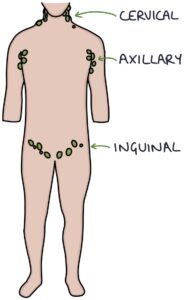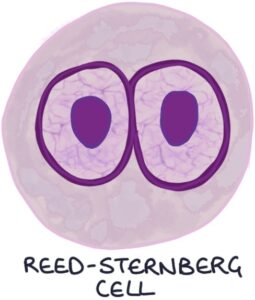Lymphoma is a type of cancer affecting the lymphocytes inside the lymphatic system. Cancerous cells proliferate inside the lymph nodes, causing the lymph nodes to become abnormally large (lymphadenopathy).

The many types of lymphoma fall into two categories:
- Hodgkin’s lymphoma (a specific disease)
- Non-Hodgkin’s lymphoma (which includes all other types)
Hodgkin’s Lymphoma
Hodgkin’s lymphoma is the most common specific type of lymphoma. It has a bimodal age distribution with peaks around 20-25 and 80 years.
Risk factors for Hodgkin’s lymphoma include:
- HIV
- Epstein-Barr virus
- Autoimmune conditions, such as rheumatoid arthritis and sarcoidosis
- Family history
Non-Hodgkin Lymphoma
Non-Hodgkin’s lymphoma includes many types. A few notable ones are:
- Diffuse large B cell lymphoma typically presents as a rapidly growing painless mass in older patients
- Burkitt lymphoma is particularly associated with Epstein-Barr virus and HIV
- MALT lymphoma affects the mucosa-associated lymphoid tissue, usually around the stomach
Risk factors for non-Hodgkin’s lymphoma include:
- HIV
- Epstein-Barr virus
- Helicobacter pylori (H. pylori) infection is associated with MALT lymphoma
- Hepatitis B or C infection
- Exposure to pesticides
- Exposure to trichloroethylene (a chemical with a variety of industrial uses)
- Family history
Presentation
Lymphadenopathy is the key presenting symptom. The enlarged lymph node or nodes might be in the neck, axilla or inguinal region. They are characteristically non-tender and feel firm or rubbery.
Patients with Hodgkin’s lymphoma may experience lymph node pain after drinking alcohol.
B symptoms refer to systemic symptoms of lymphoma:
- Fever
- Weight loss
- Night sweats
Additional non-specific symptoms can include:
- Fatigue
- Itching
- Cough
- Shortness of breath
- Abdominal pain
- Recurrent infections
Investigations
Lymph node biopsy is a critical diagnostic investigation.
Reed-Sternberg cells are the characteristic finding from a biopsy of Hodgkin’s lymphoma. They are large cancerous B lymphocytes with two nuclei and prominent nucleoli, giving them a cartoonish appearance of an owl face with large eyes.

CT, MRI, and PET scans may be used to help diagnose and stage the disease.
Lugano Classification
The Lugano classification system is used for Hodgkin’s and non-Hodgkin’s lymphoma (replacing the older Ann Arbor system). It emphasises whether the affected nodes are above or below the diaphragm. A simplified version is:
- Stage 1: Confined to one node or group of nodes
- Stage 2: In more than one group of nodes but on the same side of the diaphragm (either above or below)
- Stage 3: Affects lymph nodes both above and below the diaphragm
- Stage 4: Widespread involvement, including non-lymphatic organs, such as the lungs or liver
Management
The critical treatments for Hodgkin’s lymphoma are chemotherapy and radiotherapy. Treatment aims to cure the disease, and this is usually successful. However, there is a risk of relapse and side effects from treatment.
Chemotherapy may result in infections, cognitive impairment, secondary cancers (e.g., leukaemia) and infertility.
Radiotherapy creates a risk of tissue fibrosis, secondary cancers and infertility.
Management of non-Hodgkin’s lymphoma depends on the type and stage. It may involve:
- Watchful waiting
- Chemotherapy
- Monoclonal antibodies (e.g., rituximab, which targets B cells)
- Radiotherapy
- Stem cell transplantation
Last updated August 2023
Now, head over to members.zerotofinals.com and test your knowledge of this content. Testing yourself helps identify what you missed and strengthens your understanding and retention.

